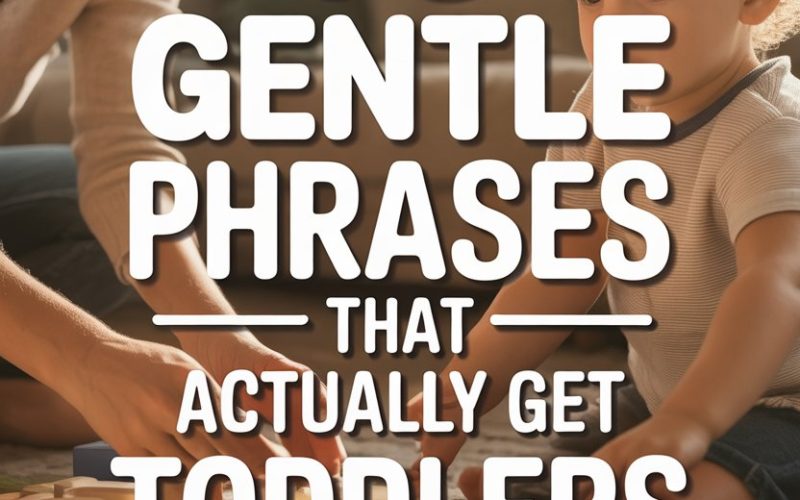Ever tried negotiating with a toddler over shoes? Or prising a half-eaten rice cake out of tiny, iron-fisted hands? If your answer is “Yes, just this morning, and possibly every day since 2019,” you’re in excellent company.
The truth is, wrangling those little bundles of energy into daily routines without a battle worthy of a Shakespearean tragedy is the real parenting flex.
But here’s the secret: toddlers have their own logic, their own pace, and their own delightful inability to see why pants are necessary for breakfast.
The trick isn’t to out-yell or out-negotiate them—it’s all about gentle, clever phrases that work with their wiring, not against it. Ready for some actual magic words? Pull up that lukewarm cuppa.
These are tested, toddler-approved, and might just save your sanity before bedtime.
1. Can you help me with this?
Toddlers love being important.
The big secret? They’re hardwired to want to help—and research published in the journal Child Development shows that even young children are more cooperative when they feel like part of the team rather than mere bystanders.
When you invite your toddler to be your assistant, you’re not just getting their attention; you’re boosting their independence and confidence.
Instead of, “Pick up your toys,” try, “Can you help me tidy these blocks so our room looks extra nice?” You’ll be amazed at their enthusiasm. (And if you really ham up your gratitude, you might just get an encore performance.)
2. It’s time to…
If there’s one thing that turns a toddler’s legs to jelly, it’s the word “now!” It’s as if “now” is toddler code for “prepare the protest banners.”
Framing requests with “It’s time to…” creates a gentle cue, not a demand. “It’s time to put on your shoes,” is less confrontational than “Put on your shoes.”
It feels like an invitation to join in a routine, rather than a barking order.
The best part? This phrase works beautifully with visual timers or a favourite song, making transitions much smoother.
Pro tip: singing “It’s time to clean up” to the tune of literally any children’s show jingle is 87% more effective. (Rough estimate. But still.)
3. Would you like to do it by yourself or shall I help?
Every toddler fancies themself Captain of the Independence Ship—until suddenly, they don’t, and being carried is the only way to move from the lounge to the kitchen.
Giving a choice between “doing it myself” or “do you want help?” is a win-win.
Studies from the Journal of Experimental Child Psychology show that offering limited choices boosts cooperation and reduces tantrums. Letting them pick gives them a sense of control within boundaries you set.
“Would you like to climb in your car seat or shall I help this time?” Either way, that car seat is happening—but now it’s their idea, and that makes all the difference.
4. I see you’re having big feelings
Meltdowns are basically toddler TED Talks: passionate, loud, and rarely on topic. The trick isn’t to shut them down, but to let your child feel heard.
Acknowledging emotions—naming them out loud—does wonders for calming the storm.
According to Dr. Daniel Siegel and Dr. Tina Payne Bryson, authors of The Whole-Brain Child, labeling feelings helps young children process them faster.
Try, “I see you’re feeling upset because the blue cup is in the dishwasher. That’s really hard.” You don’t have to fix it instantly.
Sometimes just hearing “I get it” is what they need to start moving on. (Eventually. Maybe after the floor demonstration.)
5. When you’re ready, we can…
Patience isn’t always a parent’s strong suit. (Is anyone’s coffee ever actual drinking temperature?) Still, giving your toddler a little space to recalibrate can work wonders.
Using “When you’re ready, we can go to the park” puts the power back in their hands, without an ultimatum. It shows respect for their process, and takes the heat off the moment.
This phrase is especially handy for transitions or when your child is stuck on a stubborn “No!”. It’s gentle, non-confrontational, and gives them a soft landing back to you—no bribes or threats required.
6. I’ll wait for you
Toddlers move at a speed entirely unrelated to the urgency of the situation. Need to leave for nursery? Time for a detour to examine every pebble in the driveway.
Saying, “I’ll wait for you,” signals you’re there, you’re present, and you’re not about to drag them kicking and screaming. It reduces anxiety about separation and supports their need for autonomy.
For parents, it’s an exercise in deep, cleansing breaths. For toddlers, it’s the trust fall of childhood. They know you’re steady—even if their sock is inside out and they’re emotionally attached to wearing it that way.
7. Can you show me how you do it?
Nothing lights up a toddler like being the expert. Instead of correcting or micromanaging, invite them to demonstrate their way.
“Can you show me how you brush your teeth?” is likely to get more cooperation (and possibly a little performance) than “You’re not doing it right!” This phrase is about celebrating effort, not perfection.
Educational psychologist Dr. Laura Markham recommends this approach for fostering confidence and reducing resistance.
Even if it means toothpaste on the cat once or twice, you’re building skills and trust. And possibly a future dentist.
8. Thank you for…
Positive reinforcement isn’t just for puppies (though, honestly, some days the parenting crossover is uncanny). Catch your toddler being brilliant, and say it out loud.
“Thank you for putting your boots by the door!” or “Thank you for using your quiet voice while your sister naps!” turns good behaviour into something worth repeating.
The more you highlight the moments you want to see, the more likely they are to pop up again—and not just for the applause.
Research from Harvard University’s Center on the Developing Child shows that regular, specific praise builds emotional regulation and motivation. Make it part of your daily routine, and watch the magic multiply.
9. Oops, try again
Mistakes are part of the toddler job description. Spilt water, shoes on the wrong feet, the occasional crayon mural on the wall—it’s all part of the process.
“Oops, try again,” is a gentle, judgment-free way to encourage learning without shaming. This phrase signals, “It’s okay to get things wrong, and you can always have another go.”
Instead of “No, that’s wrong!” a quick, “Oops, let’s try again,” keeps them in the game. Plus, it lowers the stakes, so they’re more likely to keep trying.
10. I love spending time with you
Sometimes, all a toddler really wants is to be seen and cherished. “I love spending time with you,” isn’t about manipulation or clever phrasing—it’s just the truth.
Saying this out loud, in the middle of a busy day (or a particularly sticky snack session), works wonders.
It meets their need for connection, which, according to attachment theory researchers, is the foundation for good listening and cooperation.
You don’t need to wait for a big moment. Whisper it while you’re putting on shoes, during nappy changes, or even while gently wrestling them into pyjamas.
Every little reminder builds trust—and a more peaceful day.
Bringing Gentle Words Home
There’s no silver bullet for toddler listening skills, but there is a gentle toolkit.
The best part? Every one of these phrases is easy to remember—no parenting degree required, and no need to consult a flowchart during a meltdown.
Start with one or two that feel most natural. Sprinkle them in during those tricky times—getting dressed, leaving the park, or the sacred bedtime wind-down.
Above all else, remember this: you’re doing a brilliant job, even when it feels like you’re herding cats with opinions.
Gentle words won’t fix every tantrum, but they’ll definitely soften the edges—and sometimes, that’s all anyone really needs.
Now, if someone could convince toddlers that socks are not negotiable, we’d all be set.




